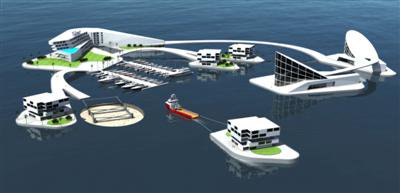Dasta holds public hearings in Phuket

PHUKET CITY: The public organization pushing to develop the Ao Phuket mega-project off Saphan Hin is conducting public hearings to gauge reaction to the possibility of designating all of Phuket as a special administrative zone for sustainable tourism.
Designated Areas for Sustainable Tourism Administration (Dasta), a public organization whose board answers directly to the Prime Minister’s Office, held the first in a series of public hearings with representatives from Muang, Thalang and Kathu districts at the Royal Phuket City Hotel on June 30.
The Dasta board was last in Phuket in May last year, when Samak Sundaravej’s government gave the agency the green light to develop a 100-billion-baht mega-project, including a convention center and marina, in Phuket Bay.
Subsequent public hearings at the time led to a request for more of Phuket to come under Dasta’s purview.
Through its consultant firm Phisut Technology Company, Dasta has organized a series of ten public hearings this month to include all of Phuket’s local administration organizations.
The first of these was held at the Phuket Merlin Hotel on Monday, when the Dasta administrative framework was presented to representatives from Phuket City and Wichit municipalities.
Most of those present were in favor of putting Phuket City and Wichit under Dasta administration.
Dr Prasit Koysiripong, president of the Old Phuket Town Foundation, said a Dasta listing would improve the lives of Phuket City residents and aid in preserving the historically significant areas of the old quarter.
Thiti Sawisai, who heads the Phuket City Environment Protection Community, was less impressed.
Dasta’s stated objectives are laudable, but the agency seems to lack specific measures to meet these objectives, especially where environmental protection is concerned, he said.
“The project is unclear on how problems would actually be solved. Since Phuket is like a beloved daughter to us I really don’t agree with this project,” he said.
To this, city planner Somchai Poetiwongsajarn of Phisut Technology said specific measures would follow only after an area has been listed under Dasta and detailed studies conducted.
Two areas in Thailand are currently listed under Dasta: Koh Chang in Trat province and Chiang Mai Night Safari. Pattaya is also in the process of becoming listed.
“At first we wanted to list only the Ao Phuket project under Dasta, but now we are considering listing the entire island. It is up to the people to decide,” Mr Somchai said.
As the Dasta board reports to the Prime Minister’s Office, project reports and proposals are submitted for approval directly to Cabinet, thus bypassing normal bureaucratic procedures, he added.
Following the public hearings, Dasta could apply for a Phuket listing. Cabinet approval would take about three months, he said.
If granted, Dasta would then set up a local office and draw up a list of specific projects for implementation.
The office would be staffed in part by Phuket residents, who would be responsible for collecting the required information and liaising with local administrative bodies tasked with carrying out the work.
As for funding, income derived from Dasta projects would be remitted to local administrative bodies and not back to the central government, thus ensuring that local people benefit, he said.
Dasta executive board member Rajatin Syamananda, who has pushed for the Ao Phuket project since his time as Director General of the Interior Ministry’s Department of Town and Country Planning, also attended the hearing in Phuket City.
Mr Rajatin insists that any Dasta project, including Ao Phuket, will only move forward with solid public support. He is still keen on the Ao Phuket project, however.
The project would remove a layer of mud and tin mining dregs covering 10,000 rai of Phuket Bay and restore the bay’s natural sandy bed, he said.
Dasta listing would also help address the other pressing environmental issues facing Phuket City, such as solid waste management and wastewater treatment.
Problems in both of these areas are the result of poor city planning, he told the meeting.
— Atchaa Khamlo
Latest Thailand News
Follow The Thaiger on Google News:


























